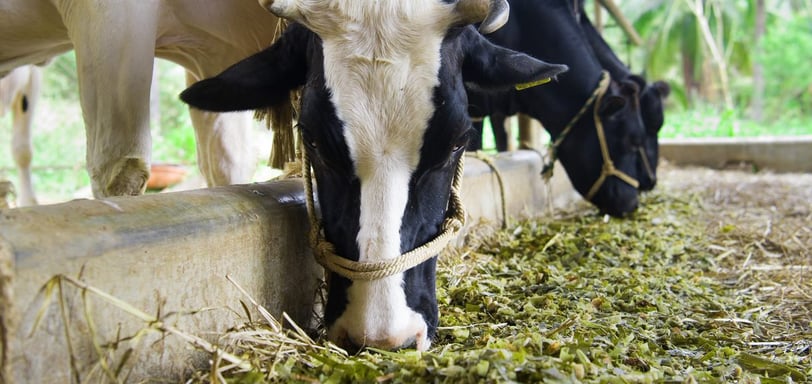The Latest Studies on Moringa as Animal Feed: A Sustainable Superfood for Livestock and Poultry
As the demand for sustainable and nutrient-dense animal feed increases, Moringa oleifera has emerged as a powerful natural supplement for livestock, poultry, and even aquaculture
7/22/20252 min read


As the demand for sustainable and nutrient-dense animal feed increases, Moringa oleifera has emerged as a powerful natural supplement for livestock, poultry, and even aquaculture. Known for its high protein content, essential amino acids, and bioactive compounds, moringa is being studied globally as a feed additive with promising results.
In this article, we explore the most recent research on moringa as an animal feed, its benefits, limitations, and practical applications for farmers and agribusinesses.
Why Moringa for Feed?
Moringa leaves are rich in:
Crude protein (up to 25–30% dry matter)
Essential amino acids (e.g., methionine, lysine)
Minerals (calcium, iron, potassium)
Vitamins A, B, C, E
Bioactive compounds with antioxidant, antimicrobial, and immune-boosting properties
These nutrients make it a valuable supplement or partial replacement for traditional feeds like soybean meal or alfalfa.
1. Poultry: Enhanced Growth and Egg Production
Study (2023) by El-Bahr et al. published in Veterinary World demonstrated that supplementing broiler chicken diets with moringa leaf meal at 5–10% improved:
Weight gain
Feed conversion ratio
Immune response
Antioxidant status
For laying hens, a study published in Poultry Science Journal (2022) reported:
Increased egg weight
Higher yolk pigmentation (due to carotenoids in moringa)
Reduced cholesterol levels in eggs
2. Ruminants: Boosting Milk Yield and Digestibility
In a 2024 study by Kumar et al. (Animal Feed Science and Technology), cows fed with a moringa-supplemented diet showed:
Improved milk yield by up to 18%
Enhanced milk fat and protein content
Better dry matter intake and digestibility
Moringa leaves have also been shown to reduce methane emissions in ruminants, making it a more environmentally friendly choice.
3. Aquaculture: Healthier Fish with Less Cost
Moringa is also gaining attention in aquaculture, especially as a partial replacement for fishmeal. A 2023 study from Aquaculture Reports indicated that replacing 25–50% of fishmeal with moringa leaf meal in tilapia feed:
Supported normal growth rates
Improved feed efficiency
Enhanced fish immunity
How to Use Moringa in Animal Feed
Form:
Dried moringa leaf powder
Moringa leaf meal (sun- or oven-dried)
Silage or fermented form
Inclusion Rates:
Poultry: 5–10% of total feed
Ruminants: 10–20% as part of roughage
Fish: 10–50% replacement for fishmeal
Too much moringa may reduce palatability due to tannins or fiber content, so optimal dosage is key.
Conclusion
The latest research confirms that moringa is a powerful, sustainable, and economical supplement for animal feed. With proper dosage and processing, it can significantly enhance livestock productivity, immunity, and even reduce environmental impact.
For bulk buyers, choosing a reliable source of organically grown, properly dried moringa leaf powder is essential for achieving consistent results.
Ready to Create Your Own Moringa Product Line?
Request a free sample
Get our bulk pricing and shipping guide
Schedule a consultation with our export team
Contact us by email to info@tombakmoringa.com now to get started.
References
El-Bahr, S. M., et al. (2023). "Effect of Moringa oleifera Leaf Meal on Broiler Performance." Veterinary World, 16(1), 45-53.
Kumar, R., et al. (2024). "Inclusion of Moringa Leaf Meal in Dairy Cow Diet." Animal Feed Science and Technology, 326, 115343.
Abou-Elkhair, R., et al. (2022). "Impact of Moringa Leaf Meal on Egg Production." Poultry Science Journal, 60(4), 501-509.
Tiamiyu, L. O., et al. (2023). "Replacing Fishmeal with Moringa Leaf Meal in Tilapia Feed." Aquaculture Reports, 30, 101654.
Quality product and service only!
Sourcing the world with Indonesia's best moringa and Sumatran spices
Contact us
Partnership
info@tombakmoringa.com
+62 821 4000 8727
© PT TMO. All rights reserved.
